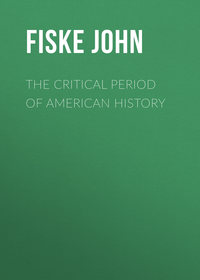 полная версия
полная версияThe American Revolution
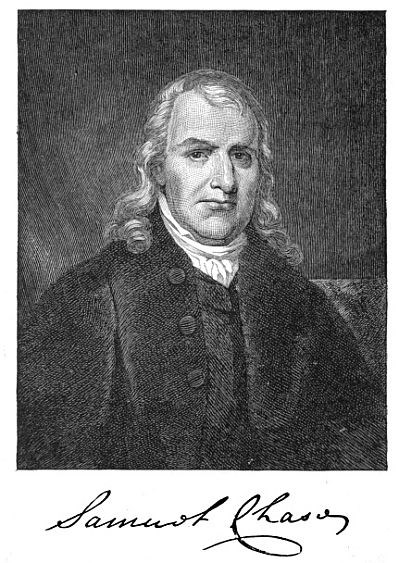
In Pennsylvania there was hot discussion, for the whole strength of the proprietary government was thrown into the scale against independence. Among the Quakers, too, there was a strong disposition to avoid an armed conflict on any terms. A little while before, they had held a convention, in which it was resolved that “the setting up and putting down kings and governments is God’s peculiar prerogative, for causes best known to himself, and that it is not our business to have any hand or contrivance therein; nor to be busybodies above our station, much less to plot and contrive the ruin or overturn of any of them, but to pray for the king and safety of our nation and good of all men; that we may lead a peaceable and quiet life in all goodness and honesty, under the government which God is pleased to set over us. May we, therefore, firmly unite in the abhorrence of all such writings and measures as evidence a desire and design to break off a happy connection we have hitherto enjoyed with the kingdom of Great Britain, and our just and necessary subordination to the king and those who are lawfully placed in authority under him.” This view of the case soon met with a pithy rejoinder from Samuel Adams, who, with a quaint use of historical examples, proved that, as the rise of kings and empires is part of God’s special prerogative, the time had now come, in the course of divine providence, for the setting up of an independent empire in the western hemisphere. Six months ago, the provincial assembly had instructed its delegates to oppose independence; but on the 20th of May a great meeting was held at the State House, at which more than seven thousand people were present, and it was unanimously resolved that this act of the assembly “had the dangerous tendency to withdraw this province from that happy union with the other colonies which we consider both our glory and our protection.” The effect of this resolution was so great that on the 18th of June a convention was held to decide on the question of independence; and after six days of discussion, it was voted that a separation from Great Britain was desirable, provided only that, under the new federal government, each state should be left to regulate its own internal affairs. On the 14th of June, a similar action had been taken by Delaware.
MarylandIn Maryland there was little reason why the people should wish for a change of government, save through their honourable sympathy with the general interests of the United Colonies. Not only was the proprietary government deeply rooted in the affections of the people, but Robert Eden, the governor holding office at this particular time, was greatly loved and respected. Maryland had not been insulted by the presence of troops.
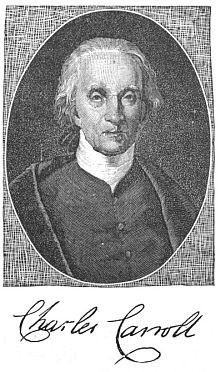
She had not seen her citizens shot down in cold blood like Massachusetts, or her chief city laid in ashes like Virginia; nor had she been threatened with invasion and forced to fight in her own defence like North Carolina. Her direct grievances were few and light, and even so late as the 21st of May, she had protested against any action which might lead to the separation of the colonies from England. But when, in June, her great leaders, Samuel Chase and Charles Carroll of Carrollton, determined to “take the sense of the people,” a series of county meetings were held, and it was unanimously voted that “the true interests and substantial happiness of the United Colonies in general, and this in particular, are inseparably interwoven and linked together.” As soon as the colony had taken its stand upon this broad and generous principle, the governor embarked on a British man-of-war before Annapolis, bearing with him the kindly regrets and adieus of the people, and on the 28th of June the delegates in Congress were duly authorized to concur in a declaration of independence.
Peaceful Maryland was thus the twelfth colony which formally committed itself to the cause of independence, as turbulent North Carolina, under the stimulus of civil war and threatened invasion, had been the first. Accordingly on the 1st of July, the day when the motion of Richard Henry Lee was to be taken up in Congress, unanimous instructions in favour of independence had been received from every one of the colonies, except New York.
The situation in New YorkIn approaching this momentous question New York was beset by peculiar difficulties. Not only was the Tory party unusually strong there, for reasons already stated, but the risks involved in a revolutionary policy were greater than anywhere else. From its commanding military position, it was clear that the British would direct their main efforts toward the conquest of this central colony; and while on the one hand the broad, deep waters about Manhattan Island afforded an easy entrance for their resistless fleet, on the other hand the failure of the Canadian expedition had laid the whole country open to invasion from the north, and the bloodthirsty warriors of the Long House were not likely to let slip so fair an opportunity for gathering scalps from the exposed settlements on the frontier. Not only was it probable, for these reasons, that New York would suffer more than any other colony from the worst horrors of war, but as a commercial state with only a single seaport, the very sources of her life would be threatened should the British once gain a foothold upon Manhattan Island. The fleet of Lord Howe was daily expected in the harbour, and it was known that the army which had been ousted from Boston, now largely reinforced, was on its way from Halifax to undertake the capture of the city of New York. To guard against this expected danger, Washington had some weeks since moved his army thither from Boston; but his whole effective force did not exceed eight thousand men, and with these he was obliged to garrison points so far apart as King’s Bridge, Paulus Hook, Governor’s Island, and Brooklyn Heights. The position was far less secure than it had been about Boston, for British ships could here come up the Hudson and East rivers, and interpose between these isolated detachments. As for Staten Island, Washington had not troops enough to occupy it at all, so that when General Howe arrived, on the 28th of June, he was allowed to land there without opposition. It was a bitter thing for Washington to be obliged to permit this, but there was no help for it. Not only in numbers, but in equipment, Washington’s force was utterly inadequate to the important task assigned it, and Congress had done nothing to increase its efficiency beyond ordering a levy of twenty-five thousand militia from New England and the middle colonies, to serve for six months only.
The Tryon plot, June, 1779Under these circumstances, the military outlook, in case the war were to go on, was certainly not encouraging, and the people of New York might well be excused for some tardiness in committing themselves irrevocably on the question of independence, especially as it was generally understood that Lord Howe was coming armed with plenary authority to negotiate with the American people. To all the other dangers of the situation there was added that of treachery in the camp. Governor Tryon, like so many of the royal governors that year, had taken refuge on shipboard, whence he schemed and plotted with his friends on shore. A plan was devised for blowing up the magazines and seizing Washington, who was either to be murdered or carried on board ship to be tried for treason, according as the occasion might suggest. The conspiracy was discovered in good time; the mayor of New York, convicted of correspondence with Tryon, was thrown into jail, and one of Washington’s own guard, who had been bribed to aid the nefarious scheme, was summarily hanged in a field near the Bowery. Such a discovery as this served to throw discredit upon the Tory party. The patriots took a bolder stand than ever, but when the 1st of July came it found the discussion still going on, and the New York delegates in Congress were still without instructions.
Final debate on Lee’s motionOn the 1st of July Congress resolved itself into a committee of the whole, to “take into consideration the resolution respecting independency.” As Richard Henry Lee was absent, John Adams, who had seconded the motion, was called upon to defend it, which he did in a powerful speech. He was ably opposed by John Dickinson, who urged that the country ought not to be rashly committed to a position, to recede from which would be infamous, while to persist in it might entail certain ruin. A declaration of independence would not strengthen the resources of the country by a single regiment or a single cask of powder, while it would shut the door upon all hope of accommodation with Great Britain. And as to the prospect of an alliance with France and Spain, would it not be well to obtain some definite assurances from these powers before proceeding to extremities? Besides all this, argued Dickinson, the terms of confederation among the colonies were still unsettled, and any declaration of independence, to have due weight with the world, ought to be preceded by the establishment of a federal government. The boundaries of the several colonies ought first to be fixed, and their respective rights mutually guaranteed; and the public lands ought also to be solemnly appropriated for the common benefit. Then, the orator concluded, “when things shall have been thus deliberately rendered firm at home and favourable abroad, – then let America, attollens humeris famam et fata nepotum, bearing up her glory and the destiny of her descendants, advance with majestic steps, and assume her station among the sovereigns of the world.”
That there was great weight in some of these considerations was shown only too plainly by subsequent events. But the argument as a whole was open to the fatal objection that if the American people were to wait for all these great questions to be settled before taking a decisive step, they would never be able to take a decisive step at all. The wise statesman regards half a loaf as better than no bread.
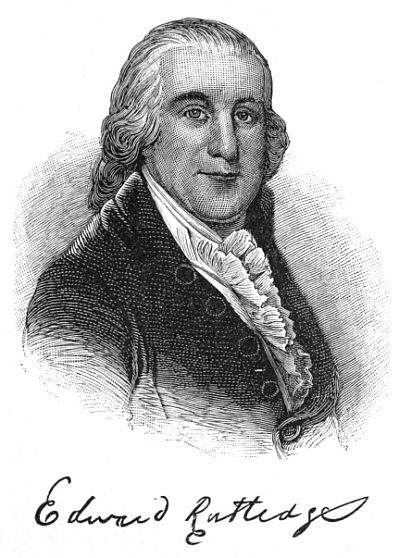
Independent action on the part of all the colonies except New York had now become an accomplished fact. All were really in rebellion, and their cause could not fail to gain in dignity and strength by announcing itself to the world in its true character. Such was now the general feeling of the committee. When the question was put to vote, the New York delegates were excused, as they had no sufficient instructions. Of the three delegates from Delaware, one was absent, one voted yea, and one nay, so that the vote of the colony was lost. Pennsylvania declared in the negative by four votes against three. South Carolina also declared in the negative, but with the intimation from Edward Rutledge that it might not unlikely reverse its vote, in deference to the majority. The other nine colonies all voted in the affirmative, and the resolution was reported as agreed to by a two thirds vote. On the next day, when the vote was formally taken in regular session of Congress, the Delaware members were all present, and the affirmative vote of that colony was secured; Dickinson and Morris stayed away, thus reversing the vote of Pennsylvania; and the South Carolina members changed for the sake of unanimity.
Thus was the Declaration of Independence at last resolved upon, by the unanimous vote of twelve colonies, on the 2d of July, 1776; and this work having been done, Congress at once went into committee of the whole, to consider the form of declaration which should be adopted. That no time might be lost in disposing of this important matter, a committee had already been selected three weeks before, at the time of Lee’s motion, to draw up a paper which might be worthy of this great and solemn occasion. Thomas Jefferson, John Adams, Benjamin Franklin, Roger Sherman, and Robert Livingston were the members of the committee, and Jefferson, as representing the colony which had introduced the resolution of independence, was chosen to be the author of the Declaration.
Thomas JeffersonJefferson, then but thirty-three years of age, was one of the youngest delegates in Congress; but of all the men of that time, there was, perhaps, none of wider culture or keener political instincts. Inheriting a comfortable fortune, he had chosen the law as his profession, but he had always been passionately fond of study for its own sake, and to a wide reading in history and in ancient and modern literature he added no mean proficiency in mathematics and in physical science. He was skilled in horsemanship and other manly exercises, and in the management of rural affairs; while at the same time he was sensitively and delicately organized, playing the violin like a master, and giving other evidences of rare musical talent. His temper was exceedingly placid, and his disposition was sweet and sympathetic. He was deeply interested in all the generous theories of the eighteenth century concerning the rights of man and the perfectibility of human nature; and, like most of the contemporary philosophers whom he admired, he was a sturdy foe to intolerance and priestcraft. He was in his way a much more profound thinker than Hamilton, though he had not such a constructive genius as the latter; as a political leader he was superior to any other man of his age; and his warm sympathies, his almost feminine tact, his mastery of the dominant political ideas of the time, and, above all, his unbounded faith in the common-sense of the people and in their essential rectitude of purpose served to give him one of the greatest and most commanding positions ever held by any personage in American history.
Independence declared, July 4, 1776On the evening of the 4th of July, 1776, the Declaration of Independence was unanimously adopted by twelve colonies, the delegation from New York still remaining unable to act. But the acquiescence of that colony was so generally counted upon that there was no drawback to the exultation of the people. All over the country the Declaration was received with bonfires, with the ringing of bells and the firing of guns, and with torchlight processions. Now that the great question was settled there was a general feeling of relief. “The people,” said Samuel Adams, “seem to recognize this resolution as though it were a decree promulgated from heaven.” On the 9th of July it was formally adopted by New York, and the soldiers there celebrated the occasion by throwing down the leaden statue of George III. on the Bowling Green, and casting it into bullets.
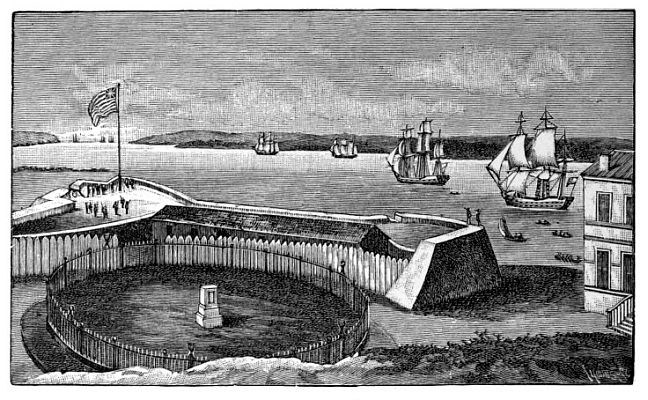
BATTERY AND BOWLING GREEN IN 1776
The Declaration was a deliberate expression of the sober thought of the American people
Thus, after eleven years of irritation, and after such temperate discussion as befitted a free people, the Americans had at last entered upon the only course that could preserve their self-respect, and guarantee them in the great part which they had to play in the drama of civilization. For the dignity, patience, and moderation with which they had borne themselves throughout these trying times, history had as yet scarcely afforded a parallel. So extreme had been their forbearance, so great their unwillingness to appeal to brute force while there yet remained the slightest hope of a peaceful solution, that some British historians have gone quite astray in interpreting their conduct. Because statesmen like Dickinson and communities like Maryland were slow in believing that the right moment for a declaration of independence had come, the preposterous theory has been suggested that the American Revolution was the work of an unscrupulous and desperate minority, which, through intrigue mingled with violence, succeeded in forcing the reluctant majority to sanction its measures. Such a misconception has its root in an utter failure to comprehend the peculiar character of American political life, like the kindred misconception which ascribes the rebellion of the colonies to a sordid unwillingness to bear their due share of the expenses of the British Empire. It is like the misunderstanding which saw an angry mob in every town meeting of the people of Boston, and characterized as a “riot” every deliberate expression of public opinion. No one who is familiar with the essential features of American political life can for a moment suppose that the Declaration of Independence was brought about by any less weighty force than the settled conviction of the people that the priceless treasure of self-government could be preserved by no other means. It was but slowly that this unwelcome conviction grew upon the people; and owing to local differences of circumstances it grew more slowly in some places than in others. Prescient leaders, too, like the Adamses and Franklin and Lee, made up their minds sooner than other people. Even those conservatives who resisted to the last, even such men as John Dickinson and Robert Morris, were fully agreed with their opponents as to the principle at issue between Great Britain and America, and nothing would have satisfied them short of the total abandonment by Great Britain of her pretensions to impose taxes and revoke charters. Upon this fundamental point there was very little difference of opinion in America. As to the related question of independence, the decision, when once reached, was everywhere alike the reasonable result of free and open discussion; and the best possible illustration of this is the fact that not even in the darkest days of the war already begun did any state deliberately propose to reconsider its action in the matter. The hand once put to the plough, there was no turning back. As Judge Drayton of South Carolina said from the bench, “A decree is now gone forth not to be recalled, and thus has suddenly risen in the world a new empire, styled the United States of America.”
CHAPTER V
FIRST BLOW AT THE CENTRE
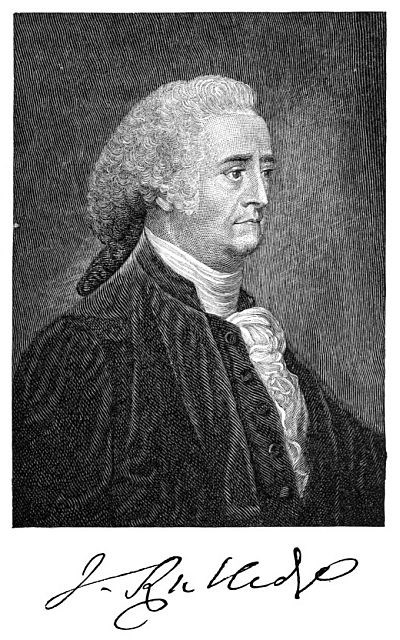
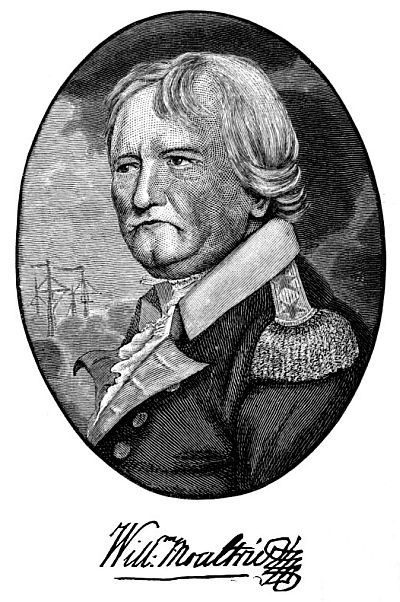
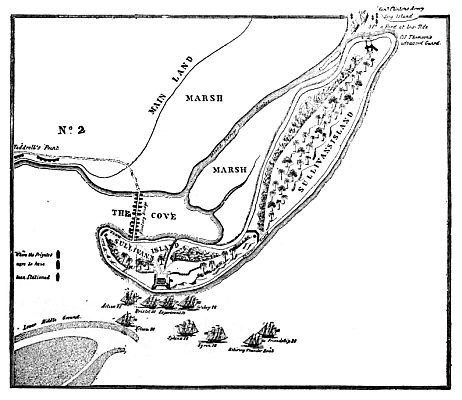
BATTLE OF FORT MOULTRIE, JUNE 28, 1776
Throughout a considerable portion of the country the news of the Declaration of Independence was accompanied by the news of a brilliant success at the South. After the defeat of Macdonald at Moore’s Creek, and the sudden arming of North Carolina, Clinton did not venture to land, but cruised about in the neighbourhood, awaiting the arrival of Sir Peter Parker’s squadron from Ireland.
Lord Cornwallis arrives upon the sceneHarassed by violent and contrary winds, Parker was three months in making the voyage, and it was not until May that he arrived bringing with him Lord Cornwallis. As North Carolina had given such unmistakable evidence of its real temper, it was decided not to land upon that coast for the present, but to go south and capture Charleston and Savannah. Lord William Campbell, refugee governor of South Carolina, urged that there was a great loyalist party in that colony, which would declare itself as soon as the chief city should be in the hands of the king’s troops. That there would be any serious difficulty in taking Charleston occurred to no one. But Colonel Moultrie had thrown up on Sullivan’s Island, commanding the harbour, a fortress of palmetto logs strengthened by heavy banks of sand, and now held it with a force of twelve hundred men, while five thousand militia were gathered about the town, under command of General Charles Lee, who had been sent down to meet the emergency, but did little more than to meddle and hinder. In his character of trained European officer, Lee laughed to scorn Moultrie’s palmetto stronghold, and would have ordered him to abandon it, but that he was positively overruled by John Rutledge, president of the provincial congress, who knew Moultrie and relied upon his sound judgment. The British commanders, Clinton and Parker, wasted three weeks in discussing various plans of attack, while the Americans, with spade and hatchet, were rapidly barring every approach to Charleston, and fresh regiments came pouring in to man the new-built intrenchments.
Battle of Fort Moultrie, June 28, 1776At last Clinton landed three thousand men on a naked sand-bank, divided from Sullivan’s Island by a short space of shallow sea, which he thought could be forded at low tide. At the proper time Sir Peter Parker was to open a lively fire from the fleet, which it was expected would knock down the fort in a few minutes, while Clinton, fording the shoals, would drive out the Americans at the point of the bayonet. The shoals, however, turned out to be seven feet deep at low water, and the task of the infantry was reduced to a desperate conflict with the swarms of mosquitoes, which nearly drove them frantic. The battle thus became a mere artillery duel between the fort and the fleet. The British fire was rapid and furious, but ineffective. Most of the shot passed harmlessly over the low fortress, and those which struck did no harm to its elastic structure. The American fire was very slow, and few shots were wasted. The cable of Parker’s flagship was cut by a well-aimed ball, and the ship, swinging around, received a raking fire which swept her deck with terrible slaughter. After the fight had lasted ten hours, the British retreated out of range. The palmetto fort had suffered no serious injury, and only one gun had been silenced. The American loss in killed and wounded was thirty-seven. On the other hand, Sir Peter’s flagship had lost her mainmast and mizzen-mast, and had some twenty shots in her hull, so that she was little better than a wreck. The British loss in killed and wounded was two hundred and five. Of their ten sail, only one frigate remained seaworthy at the close of the action. After waiting three weeks to refit, the whole expedition sailed away for New York to coöperate with the Howes. Charleston was saved, and for more than two years the southern states were freed from the invader. In commemoration of this brilliant victory, and of the novel stronghold which had so roused the mirth of the European soldier of fortune, the outpost on Sullivan’s Island has ever since been known by the name of Fort Moultrie.
It was with such tidings of good omen that the Declaration of Independence was sent forth to the world. But it was the last news of victory that for the next six months was to cheer the anxious statesmen assembled at Philadelphia. During the rest of the summer and the autumn, disaster followed upon disaster, until it might well seem as if fickle fortune had ceased to smile upon the cause of liberty.
British plan for conquering the Hudson and cutting the United Colonies in twainThe issue of the contest was now centred in New York. By conquering and holding the line of the Hudson river, the British hoped to cut the United Colonies in two, after which it was thought that Virginia and New England, isolated from each Colonies other, might be induced to consider the error of their ways and repent. Accordingly, General Howe was to capture the city of New York, while General Carleton was to descend from Canada, recapture Ticonderoga, and take possession of the upper waters of the Hudson, together with the Mohawk valley. Great hopes were built upon the coöperation of the loyalists, of whom there was a greater number in New York than in any other state, except perhaps South Carolina. It was partly for this reason, as we shall hereafter see, that these two states suffered more actual misery from the war than all the others put together. The horrors of civil war were to be added to the attack of the invader. Throughout the Mohawk valley the influence of Sir John Johnson, the Tory son of the famous baronet of the Seven Years’ War, was thought to be supreme; and it turned out to be very powerful both with the white population and with the Indians. At the other end of the line, in New York city, the Tory element was strong, for reasons already set forth. On Long Island, the people of Kings and Queens counties, of Dutch descent, were Tories almost to a man, while the English population of Suffolk was solidly in favour of independence.


